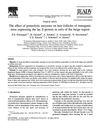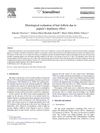TLDR Proteolytic enzymes damaged hair follicle stem cells in transgenic mice.
The study investigated the impact of proteolytic enzymes on hair follicles in transgenic mice expressing the lac-Z gene in bulge region cells, which are considered follicle stem cells. Chymotrypsin and papain were applied via iontophoresis, and trypsin was delivered in liposome form. The treatments caused significant degenerative effects, including detachment of the inner root sheath, cystic dilation of the hair shaft, and the presence of epithelial cells within the lumen. These effects suggested that hair follicle stem cells expressing beta-galactosidase were impaired and detached from the bulge area due to enzyme treatment.
 14 citations
,
March 1995 in “Journal of cell science”
14 citations
,
March 1995 in “Journal of cell science” SV40 T antigen in hair follicles causes abnormal hair and health issues in mice.
 5 citations
,
July 1999 in “JEADV. Journal of the European Academy of Dermatology and Venereology/Journal of the European Academy of Dermatology and Venereology”
5 citations
,
July 1999 in “JEADV. Journal of the European Academy of Dermatology and Venereology/Journal of the European Academy of Dermatology and Venereology” Proteolytic enzymes damage hair follicles by detaching stem cells.
 13 citations
,
January 2007 in “International journal of pharmaceutics”
13 citations
,
January 2007 in “International journal of pharmaceutics” Papain cream removes hair better than papain gel, causing hair follicles to widen and skin to thicken.
 2 citations
,
February 2023 in “Transgenic Research”
2 citations
,
February 2023 in “Transgenic Research” The E2 protein affects gene activity in hair follicles of mice.
9 citations
,
June 1999 in “Journal of Investigative Dermatology” The HPV type 11 region activates hair-specific gene expression in mice.
 38 citations
,
September 2014 in “Cell and Tissue Research”
38 citations
,
September 2014 in “Cell and Tissue Research” The hair follicle infundibulum plays a key role in skin health and disease, and understanding it better could lead to new skin disease treatments.





